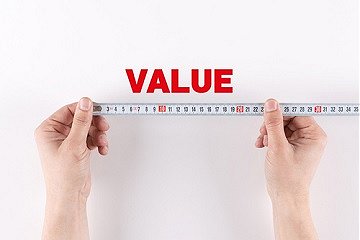How to Get What You Value by Changing What You Measure
Give Up Control & Gain Influence To Get What You Want

How to Get What You Value - The Importance Of Metrics
We live in a world driven by data and metrics. The old adage "what gets measured gets managed" has never been more pertinent.
The metrics we choose to focus on can significantly shape our outcomes, sometimes in ways we don't intend.
Why is measurement so important?
The first step in knowing how to get what you value is knowing what to measure.
Metrics provide feedback and serve as a compass, guiding decisions and behaviours within an organization or a personal endeavour.
They translate abstract goals into tangible targets.
All of that may be true but fundamentally, the emotional logic for measuring things is that it gives us a feeling of being in control and reduces the feeling of uncertainty [or we like to think it does].
How Applying The Wrong Metrics Destroyed The Value Of Boeing A classic example of this in the business world is the sorry tale of value destruction
that took place in US aircraft manufacturer Boeing. About 25 years ago a
new CEO was appointed to Boeing to clean up some alleged "procurement
irregularities" on Government contracts - a task in which he succeeded. Buoyed by this success he decided to impose a one-size-fits-all, business-school-friendly
management style on what had already been an excellent enterprise, and
in doing so he destroyed it to the tune of many tens of billions of dollars worth of value.
The strength of corporations like Boeing is the quality of working relationships, the depth and breadth of knowledge and experience, in
short the collaborative culture that is created when people work
together successfully over decades. The CEO at the time was Harry
Stonecifer and he didn't understand culture so couldn't measure it. He destroyed Boeing's collaborative culture
by outsourcing much of the business to third parties
and focused on what he did understand which was cash-flow and
contracts. Boeing today still suffers from his and his successors' legacy and lurches from one crisis to another, too big to fail and too badly run to succeed.
Knowing how to get what you value is heavily dependent on knowing what to measure and how to measure it. At time of writing I am losing weight. I understand how important it is to achieve and maintain a healthy weight so this has become something that I value highly. The primary measurement of my reducing weight is what the bathroom scales tell me. But because losing weight is a relatively slow process there is little point in me checking my weight every day. Focus on the process What is more important is for me to focus on the process of losing weight and to pay daily attention to those activities that have a direct influence on my primary objective. I monitor my attendance at the gym 5 days a week and the range of exercises that I undertake, I monitor my diet in terms of quantity and quality, I monitor the number of steps I walk every day. Tangible factors and intangible factors The
first key point to recognise is that in order to achieve the results
that we want, we need to draw a distinction between the fairly obvious
tangible things we can measure and a range of intangible factors that
are harder to measure but will have a direct influence on whether or not
you achieve your goal. We tend to measure the tangible things we can see and overlook the critical intangibles that are not so easy to see or measure. The
purpose of this article is to draw attention to this distinction and to
offer some practical suggestions as to how you can identify and monitor
these critical intangibles. TANGIBLE FACTORS - Things that you can see & easy to measure such as: - Measured as facts & figures - Measurement to Targets - Quantitative Measures - Objective Measures ALL ABOUT CONTROL INTANGIBLE FACTORS - Things you can't see & not easy to measure such as: - Measured by the value added - Measurement of Process - Qualitative Measures - Subjective Measures ALL ABOUT INFLUENCE The importance of focusing on the intangibles This is an anecdote about how to get what you value by focusing almost exclusively on the intangibles. I run a company based in Singapore that specializes in commodities,
and I have a colleague who focused on the semi-refined gold [dore]
market
with producers in Africa and buyers in the Middle East. His
approach was to focus 100% on the tangibles. It was all about the numbers and chasing the
deals - the things that were visible and easily measurable, and where he
[wrongly] assumed that with the right amount of effort he would get
good results. Over a period of several years I suggested that
he focused on the intangibles and build up his knowledge of the sector and focus on a small number of
high quality key relationships with producers, and to build up a reputation as an expert which would attract business. But he
wouldn't listen and he failed. In contrast, I have another colleague who works in the fuel sector and he took a totally different approach and focused almost exclusively on the intangibles: he
focused on deep learning of the business, and treated every opportunity and countless
failures all as learning experiences to build reputation and a
knowledge base. He built
deep and strong relationship with producers and narrowed his focus to
crude oil and liquid natural gas [LNG] figuring that at some point in
the business cycle there would be huge demand for these products. Of
course with recent events in Ukraine and the embargo on Russian fuel
this has proved to be a good move as the extreme variations that have
hit the fuel market have created massive and extremely lucrative
opportunities for him and he is making a lot of money. Control vs influence This is a personal anecdote about how to get what you value when you
come to realize that influence over the long term is far more important
than control now. When my son was in the 6th form at school studying for his 'A' levels he and I attended a series of meetings with the head of the 6th form to discuss his poor academic performance. The issue wasn't about ability - my son is highly intelligent - but was about his lack of motivation and application. These meetings took place over several months. Obviously as a parent I wanted to see my son do well academically, it was a clear and important objective, and I did all that I could to encourage him to work harder. At the last meeting with the year head, I realised that the fundamental problem was that my son was bored. I recalled behaving in a very similar way at his age. I knew that the head of 6th form was under big pressure from the school governors to ensure that it maintained a good position in the national academic league tables, and so my son's poor performance was unacceptable. I also realised that I had a choice to make: on the one hand to try to control and pressurise my son into working harder and risk alienating him or on the other hand to prioritise my relationship with him and suggest to the head that my son be allowed to leave the 6th form and go and do something else.
I realised that I would have a greater and more positive influence with my son over the long term if I chose the second course. So I gave up trying to control him, and I told the head that I valued my relationship with my son more highly than his academic performance and I said that I would not put any more pressure on him to study harder and if that meant he had to leave the 6th form then so be it. In fact my son was allowed to stay on and he managed to get 3 'A' levels of average grades. He did not go to university as he could not see the point. Fast forward 20 years and he now has a successful career in senior management in the hospitality sector and over all this time I have continued to enjoy a positive relationship with my son. This is a true story about how to get what you value at the cost of ignoring the intangibles. In the late 18th Century the German
government
decided to modernise its forestry sector.
Applying the principle that greater profit margin existed if they could better see and
measure their forestry stock, they transformed their forests with typical Germanic
efficiency. One of the major side effects of all this was the removal of all the foliage and underbrush from the forest floor. The
results, over the decades following these improvements, was a
significant uplift in revenues and the German state looked on what it
had created and decided that it was good... until the next
generation of plantations came to fruition and the yield was appalling. To
cut a long story short they discovered that the removal of all the
underbrush and associated detritus had deprived the soil of all its
nutrients. This example is useful because it contains all the elements critical for understanding tangibility/intangibility: Well-intentioned
outsiders look at a complex system, find it confusing (because of the unseen and unrecognised intangibles), and think they can improve it. "They come up with an
idealized way that the system should
work, and then use their power and authority to impose that simple,
idealized vision on this complex reality. In the short
term, everything
seems to get better as a result, they are widely praised, and then down
the line catastrophe strikes and everything comes crashing down." [Taylor Pearson]
The first step to measuring the intangibles is to identify them.
The aim here is to identify the key intangible factors that have a
direct impact on you getting what you value and that you need to focus
on. For example:
Based on my experience, here are 5 areas to explore:
With enquiry and persistence you will find that there are ways of
measuring these intangibles. This may involve thinking out of the box:
Returning to
the example of Boeing that we looked at earlier, there are ways of
understanding and measuring culture in a corporate [or any other]
entity, and it is possible to establish metrics to maintain a handle on
the ongoing contribution of corporate culture to tangible objectives. I have complied a short paper which illustrates some ways in which this can be done: How to measure the value of an organisation's culture. That
Harry Stonecifer did not understand corporate culture nor know how to
evaluate it, and the fact that he and his successors were permitted to
destroy Boeing in the way that they did suggests an appalling failure of
corporate governance. Turning the practice and measurement of intangibles into habits [so they become an unconscious competence]. For example, in my commodities company in Singapore the intangibles I focus on are: To personalise this, in every interaction with an existing or new contact I aim to build trust by always being honest and transparent with people, sharing knowledge based on experience, and seeking to build a trusting relationship over time. These intangibles are a habit and embedded in my behaviour, and they need to be because it takes time to establish a trusting relationship with people - months and often years. But the ultimate payback in terms of what I value most in business [which is long-term, sustainable profit derived from repeat business and referrals] is huge. In many situations in life and business it can often take a long time - sometimes a very long time - before the effect of all these intangibles leads to the outcome we seek. Form atomic habits What we are doing, is focusing on the process not the outcome. The best [and probably only] way that I know of achieving this is by making all of these intangibles into habits. James Clear calls these atomic habits. Clear describes these intangibles as the key irreducible components, comprised of small
and seemingly insignificant actions, that when practiced regularly yield incredible results through the power of compound growth. Embed in organisational culture In an organisational environment, these intangibles can be embedded in the corporate culture, and when this happens it leads to a sustainable competitive advantage.
For example, Herb Kelleher, former CEO of Southwest Airlines frequently said that
competitors could copy the details of his system but they couldn’t copy the culture, the
vibrant esprit de corps, because “they can’t buy that”.

How to Get What You Value - What To Measure



What happens when you can't see the wood for the trees, ignore the intangibles, and suffer from the unintended consequences...
How to Get What You Value - How To Measure The Intangibles

There have been many Southwest
case study books and articles published yet very few companies have
actually implemented it in an effective way because they don't understand it or know how to implement it.
How to Get What You Value - Recommended Further Reading

To understand how to benefit from the unseen intangibles we need to start by understanding what they are and where we find them.
These unseen intangibles contain hidden value that can have a very dramatic impact on your health, wealth and overall well-being.
How To Benefit From The Unseen Margins - 5 Key Tips For Success
Most of us spend our lives working to linear rules where there is an equal relationship between effort and result. Work hard you get a result. Work harder you get a better result. This is often referred to as the rat race.
The solution to this challenge is to work to non-linear rules and apply the principle of the power law.
This involves finding a situation where a change in one thing can lead to a disproportionately large change in another thing, and specifically where the positive results of your efforts are very considerably amplified.
How Positive Asymmetry Can Transform Your Life
We are hardwired to measure our progress in any and all areas of life where we have goals and aspirations. We can't not do it.
But what we measure and how we measure matters because our default progress measurement setting leads to self sabotage and results in deep unhappiness and dissatisfaction with our lives.
The Gap And The Gain - How Your Brain Sabotages Your Happiness
Next Article:
How to Become A Master At Overcoming Hard Moments
Return from: "How To Get What You Value" to:
Inner Mastery For Outer Impact or Walking The Talk
LATEST ARTICLES
Living in Survival Mode Without Surrendering Mental Authority
Living in Survival Mode Without Surrendering Mental Authority
 Clear Thinking When You’re Just Trying to Stay Afloat. Many people today are overwhelmed because they are living in survival mode - not temporarily, but as a persistent condition of life. For many, th…
Clear Thinking When You’re Just Trying to Stay Afloat. Many people today are overwhelmed because they are living in survival mode - not temporarily, but as a persistent condition of life. For many, th…Manifestation Without Magic: A Practical Model
 Manifestation without magic is not a softer or more intellectual version of popular manifestation culture. It is a different model altogether. Popular manifestation teachings tend to frame reality as…
Manifestation without magic is not a softer or more intellectual version of popular manifestation culture. It is a different model altogether. Popular manifestation teachings tend to frame reality as…Staying Committed When You Can't See Progress - The Psychology of Grit
 Uncertainty Is Not The Absence Of Progress, Only The Absence Of Reassurance. One of the most destabilising experiences in modern life is not failure, but uncertainty and staying committed when you can…
Uncertainty Is Not The Absence Of Progress, Only The Absence Of Reassurance. One of the most destabilising experiences in modern life is not failure, but uncertainty and staying committed when you can…The Battle For Your Mind - How To Win Inner Freedom In A Digital Age Of Distraction
 From External Events to Inner Events. We often think of “events” as things that happen out there: the traffic jam, the rude comment, the delayed email reply. But what truly shapes our experience is wh…
From External Events to Inner Events. We often think of “events” as things that happen out there: the traffic jam, the rude comment, the delayed email reply. But what truly shapes our experience is wh…How to See Your Thoughts Without Becoming the Story
 A Practical Guide to Thought-Awareness. You can spend your life inside the stories of your mind without ever learning how to see your thoughts clearly and objectively. Most of the stuff we tell oursel…
A Practical Guide to Thought-Awareness. You can spend your life inside the stories of your mind without ever learning how to see your thoughts clearly and objectively. Most of the stuff we tell oursel…The Collison Decision Matrix - A Simple Framework for Better Choices
 The Collison Decision Matrix Is A Practical Everyday Thinking Tool. Most of us spend a surprising amount of time worrying about decisions. From small ones such as what to wear, what to eat, what to te…
The Collison Decision Matrix Is A Practical Everyday Thinking Tool. Most of us spend a surprising amount of time worrying about decisions. From small ones such as what to wear, what to eat, what to te…The Power Of Asking The Right Question
 The Power Of Asking The Right Question Lies In The Quest For Insight. To experience the power of asking the right question you must develop the practice of asking questions. The best way to improve th…
The Power Of Asking The Right Question Lies In The Quest For Insight. To experience the power of asking the right question you must develop the practice of asking questions. The best way to improve th…Site Pathways
 Here is a site pathway to help new readers of Zen-Tools navigate the material on this site. Each pathway is based around one of the many key themes covered on this site and contain a 150 word introduc…
Here is a site pathway to help new readers of Zen-Tools navigate the material on this site. Each pathway is based around one of the many key themes covered on this site and contain a 150 word introduc…How To Live With Contradiction - Beyond Thought Let Stillness Speak
 A major impact on so many peoples' lives is the situational contradiction of unfilled realistic expectations. So where does all this leave us? Well here we are, with mental equipment that is more lim…
A major impact on so many peoples' lives is the situational contradiction of unfilled realistic expectations. So where does all this leave us? Well here we are, with mental equipment that is more lim…How To Trust The Process Of Mindfulness - Right Now
 In mindfulness, the process isn’t some distant goal — it's what is happening right now. When we talk about how to trust the process of mindfulness the credibility of the process is heavily dependent…
In mindfulness, the process isn’t some distant goal — it's what is happening right now. When we talk about how to trust the process of mindfulness the credibility of the process is heavily dependent…Inner Mastery For Outer Impact - Mental Clarity For Effective Action
 Insights only matter if they translate into consistent action. In a world crowded with quick fixes and motivational soundbites, the theme “Inner Mastery for Outer Impact” calls us to something more e…
Insights only matter if they translate into consistent action. In a world crowded with quick fixes and motivational soundbites, the theme “Inner Mastery for Outer Impact” calls us to something more e…